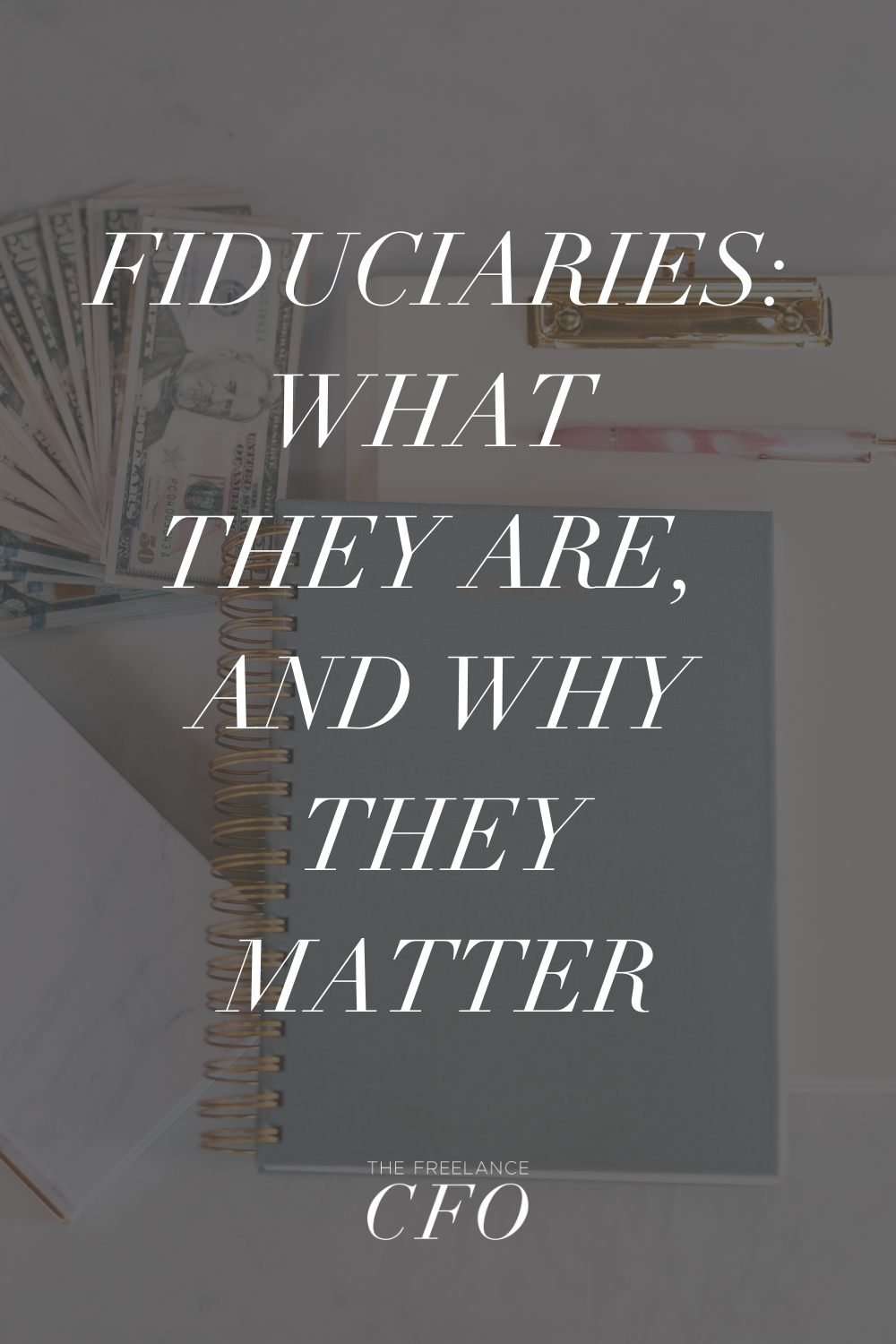Fiduciaries: What They Are, and Why They Matter
When entering into the world of personal or business finance, the word “fiduciary” may get thrown around quite a bit. “I have the fiduciary duty” this, and “My responsibilities as fiduciary” that, you get the picture… but what exactly is a fiduciary, and why are they so f*cking important?
What is a fiduciary?
The “duty to care” aspect of fiduciary obligation remains the most crucial. Fiduciaries act in the best interests of their client and work hard to uncover the best possible plans in relation to their long-term financial goals. This requires honesty, trust and good faith between all parties involved. That should be pretty automatic, right?
How far does “duty of care” extend?
But is a fiduciary’s duty to their client complete after a plan is created, implemented and found to be successful? No. Their duty extends beyond and into the future.
When financial crises strike – such as the recent pandemic and stock market roller coaster – it’s a fiduciary responsibility to reach out to their clients, ask what they need and help them prepare for the worst possible scenario. It’s a fiduciary’s responsibility to look at a client’s ten-year-plan, and check in regularly to make sure that plan is on track, and to help the client adjust if needed. And, in some cases, it’s a fiduciary’s responsibility to say “no” when necessary. For example, when approached by a potential client whose goals and plans do not align with your own philosophy, it’s a fiduciary’s responsibility to respectfully decline and guide the individual towards a financial planner or strategist that would better represent their interests.
And that should be pretty automatic too, right?
Well. Here’s the thing.
Are all finance experts and professionals fiduciaries?
Thing is, not every financial expert you work with in your life has to be a fiduciary in order to do business with you. Most financial experts out there are only legally required to reach a suitability standard of conduct, meaning that their recommendations must only be suitable for a client in line with their current financial situation, priorities and means. That doesn’t mean that they can just screw you over and run with the money - that’s literally illegal - but it does mean they don’t have to recommend the best option to you, as long as it meets a basic threshold of care.
Basically, a client or customers’ financial wellbeing isn’t every financial expert’s top priority.
Fiduciary duties, however, extend beyond creating the “perfect” financial plan. It requires complete transparency, tough conversations and sometimes even individual sacrifice. A fiduciary’s first “duty of care” to their client’s healthiest financial wellbeing is paramount and any dereliction of duty in this regard can lead to civil or even criminal penalties.
So, how can I tell if someone is a fiduciary or not?
Financial advising firms are regulated and The easiest way to discover whether or not a financial expert you are working with - or considering working with - is a fiduciary, is to search for them in these databases (both of which can be found online).
The National Association of Personal Financial Advisors Database
SEC (U.S. Securities and Exchange Commission) Adviser Database
While accounting and bookkeeping firms aren’t technically “financial advising firms,” they fall under the umbrella of fiduciary responsibility simply by their function and definition. This is the opposite of a broker-dealer, who is only bound by a suitability standard of conduct.
Wait, what? Bookkeeping firms are fiduciaries?
The AICPA Professional Code of Conduct embodies standards of conduct which are pretty close to a fiduciary relationship. Objectivity, integrity, free of conflicts of interest and truthfulness. This is not only important in terms of client-bookkeeper relationships, but in terms of maintaining professionalism and protecting the public interest. In other words, the public has to trust the integrity of your profession, as well as the individuals you work with.
Traditionally, accountants were not considered to be fiduciaries, and in some instances still cannot be held to those standards (for a variety of reasons). However, over time the threshold for finding (or, at least, being permitted to argue in litigation) that the accountants were de facto fiduciaries has been lowered by court rulings. Accountants or bookkeepers who fail to follow certain duty of care standards under the AICPA Professional Code of Conduct may be subject to severe penalties, and civil and criminal litigation.
So, should I work with a fiduciary?
Yes. Yes yes yes.
Fiduciaries offer the best, most responsible, most transparent and healthiest services in regards to what goes on with your personal and business finances. That’s not to say that there aren’t incredible finance experts out there who, while not bound by fiduciary duty, don’t work in their clients’ best interests. If you’re with someone right now who you have worked with for a while and who you trust implicitly? Good on you!
But if you’re going to give someone opinions, influence or control over your hard earned money, your future, and your financial stability - why not make sure it’s their legal responsibility to work in your best interests over all others?
What’s great is that, as a bookkeeping and accounting firm, we at The Freelance CFO are automatically bound to fiduciary duties as far as our clients’ finances are concerned. So, ya know. We got that going for us, too. 😎
So… fiduciaries are important?
Not just important. Essential. In an industry that’s constantly worried about making the bottom line, optimizing profit margins or optimizing the best possible way to exponentially grow wealth, personal finance can get, well… pretty impersonal.
But we at The Freelance CFO and other fiduciaries out there see the person before the numbers.
Clients aren’t just clients – they’re people, who should be treated with the same respect and care as you would hope to be treated. Being a fiduciary isn’t just about money. More than anything, a finance profession is a people's profession.
And your money deserves to be treated with respect by real people, too.
Sources:
Disclaimer: The information provided in this blog is for educational purposes only and does not constitute financial or tax advice. Reach out to The Freelance CFO team with any questions regarding specific financial concerns, or seek the services of a fiduciary.



